Through the Years
- What I Was Listening To
- The Radios
- Old Time Radio - Part 1
- Old Time Radio - Part 2
- New Time Radio - Part 1
- New Time Radio - Part 2
Links
What I Was Listening To
 One of the first radios I remember was this small, brown Silvertone that belonged to my parents. It was their first radio and purchased in the early 1950s. I can just imagine all the Old Time Radio shows, especially westerns, that were played on that radio during the 1950s. It ended up in my possession in the 1960s and kicked around in my stuff for a few years, losing its On/Off/Volume knob at some point. It's on my list to make a replacement knob for it and to replace the capacitors to get rid of the hum it produces now.
One of the first radios I remember was this small, brown Silvertone that belonged to my parents. It was their first radio and purchased in the early 1950s. I can just imagine all the Old Time Radio shows, especially westerns, that were played on that radio during the 1950s. It ended up in my possession in the 1960s and kicked around in my stuff for a few years, losing its On/Off/Volume knob at some point. It's on my list to make a replacement knob for it and to replace the capacitors to get rid of the hum it produces now.
My interest in radio itself started in the early-1960s when my family was living in Honolulu, Hawaii when my naval officer father was stationed at Pearl Harbor. At some point my parents had acquired an older copy of the World Book encyclopedia with a few of the annual "Yearbook" updates. I remember that the edition we had didn't explain who won World War II, pretty much ending its coverage of world events in 1943. I think it was in one of those yearbooks that I found an article on how to build your own radio. It had a tube or two and looked both complicated and fun. When my dad got home from work I showed him the article and suggested that we build one.
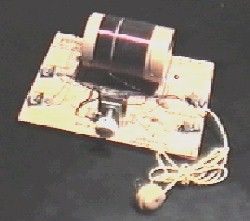 He said it was a bit too advanced and we should start with something a bit simpler. He took me to a nearby shopping center and we came home with a Philmore VC-1000 crystal radio kit. We built it together and I was amazed that it played AM radio without a power source. I really enjoyed spinning the little dial and listening to the few stations that Honolulu had at the time. My favorite was KPOI which had a rock-and-roll format, a form a music I was becoming really interested in at the time.
He said it was a bit too advanced and we should start with something a bit simpler. He took me to a nearby shopping center and we came home with a Philmore VC-1000 crystal radio kit. We built it together and I was amazed that it played AM radio without a power source. I really enjoyed spinning the little dial and listening to the few stations that Honolulu had at the time. My favorite was KPOI which had a rock-and-roll format, a form a music I was becoming really interested in at the time.
Having readily access to a radio coincided with my rising interest in popular music. We had plenty of music in our home. My mother played the piano and I took piano lessons from about second grade until I hit high school. My dad like country/western music with a stonger emphasis on the "western" with artists like Marty Robbins playing on his hi-fi system. My mother like popular artists like Sinatra, trios, and both parents liked swing. It was pretty eclectic. One day were were driving somewhere in Honolulu when Ricky Nelson's "Travelin' Man" came over the car radio. It was the first time a song got to me and I mmediately wanted to hear it again, and again, and again. I'd spin the dial on my crystal radio hoping to hear it. It was this desire for imediate music gratification that later led me to start buy records.
Southern California AM Radio in the 1960s
We moved back to Southern California at the end of 1963 and my dad went overseas for most of 1964. When he returned he had gifts he'd picked up in Japan that included Sanyo transistor radios for my sister and me. Mine was red and hers was green. These were really nice and, for me, opened the radio band up to include shortwave. I can't count the number of hours I listened to this little gem but I do know that I went through lots of batteries. Having limited resources I remember trying all sorts of things to extend the life of or renew a dead battery such as freezing them. After all, 9-volt transistor batteries didn't grow on trees.
I listened to a little bit of everything on the dial: music, talk, news, some sports, and, especially, "border blaster" radio station XERB from south of the border that featured Wolfman Jack. I also discovered DXing, finding stations outside my area that could be tuned in at night. Being that we lived in the Los Angeles area there was no shortage of stations to explore. This was also when FM multiplex stereo was sorting itself out and while it was, some stations would play one stereo channel over their FM station and the other channel over their AM station. My parents had a Sears Silvertone console that featured a tuner that had separate tuning for AM and FM bands and a switch that would put the AM in one speaker and the FM in the other. This was pure magic.
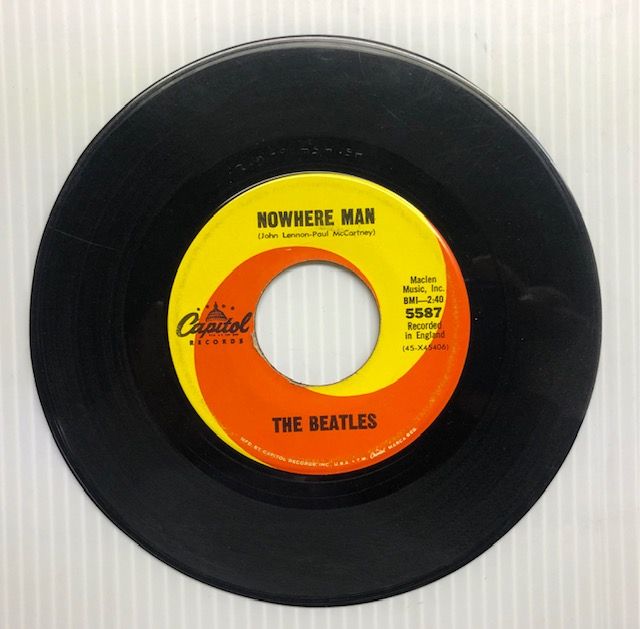 My first favorite popular music station in 1964-5 was KFWB. I particulary remember their DJ, Lord Tim, who, with his English accent at the time of the "British Invasion" made him very trendy. There were lots of songs I heard for the first time on that station like the Zombies "She's Not There," the Animials "House of the Rising Sun," and the Beatles "Nowhere Man." It was when I heard "Nowhere Man" in the Fall of 1965 that I decided I wasn't going to wait until I could hear it again on the radio so I scraped up about 75 cents and walked over to the nearby Zody's discount store and bought the 45 RPM single. This started my record buying, something that continued for many decades, a topic that will be covered on the Music section of this site.
My first favorite popular music station in 1964-5 was KFWB. I particulary remember their DJ, Lord Tim, who, with his English accent at the time of the "British Invasion" made him very trendy. There were lots of songs I heard for the first time on that station like the Zombies "She's Not There," the Animials "House of the Rising Sun," and the Beatles "Nowhere Man." It was when I heard "Nowhere Man" in the Fall of 1965 that I decided I wasn't going to wait until I could hear it again on the radio so I scraped up about 75 cents and walked over to the nearby Zody's discount store and bought the 45 RPM single. This started my record buying, something that continued for many decades, a topic that will be covered on the Music section of this site.
In the meantime, since I couldn't buy every song that I wanted to hear on demand, I recorded them from the radio. At first I was using my Starlite recorder which was really low-fidelity. In about 1966 my dad gave me an upgrade to a Crown recorder which had a better drive system, larger reels and better fidelity.
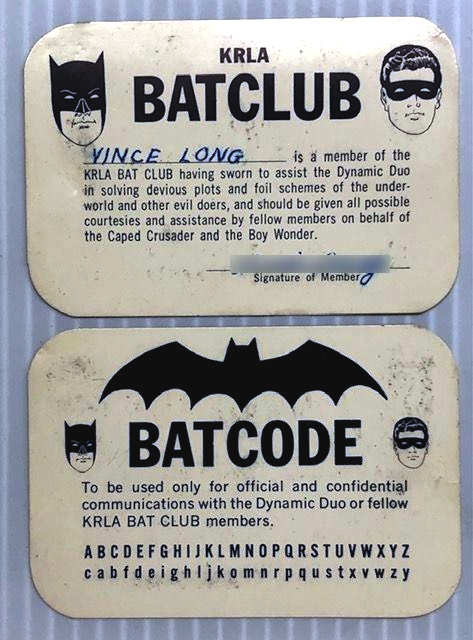 I did listen to KRLA on occassion as they were the first Los Angeles station to play the Beatles. They had some good DJs like Emperor Hudson, Bob Eubanks (later of the "Newlywed Game"), and Dave Hull, "The Hullaballooer." In 1966 they had a tie-in to the new "Batman" TV series and ran a "BatClub for listeniers to join. I was a fan of the show so, of course, I sent in for my BatCard and the BatCode card.
I did listen to KRLA on occassion as they were the first Los Angeles station to play the Beatles. They had some good DJs like Emperor Hudson, Bob Eubanks (later of the "Newlywed Game"), and Dave Hull, "The Hullaballooer." In 1966 they had a tie-in to the new "Batman" TV series and ran a "BatClub for listeniers to join. I was a fan of the show so, of course, I sent in for my BatCard and the BatCode card.
When KHJ launched its "Boss Jocks" format I switched over to them and enjoyed the "Real" Don Steel, Sam Riddle, and the other jocks on that spot on the dial. I was a loyal KHJ listener and even made an effort to pick up a copy of their "Boss 30" flyer, published weekly from the mid-60s into the 1970s that listed the top 30 songs of the week. Over time I picked up over 300 of these, spanning December 1965 to September 1970, including a 14-month run where I didn't miss a single week. I still have these treasured possessions. In 1967 and 1968 KHJ had a "Top 300" countdown and I have the flyers for those which I had to sent away for and, of course, I taped my favorite songs from that 1968 broadcast, a tape I still listen to. You can view the entire 1968 flyer below. I have the 1967 one somehwere and will add it when I dig it up. The station also played the Top 93 of the year for 1968. You can listened to scoped (music removed) versions of both below. The station also gave away stickers and other promotional materials. I had those KHJ stickers on all kind of things, such an an old set of headphones as shown on the left.
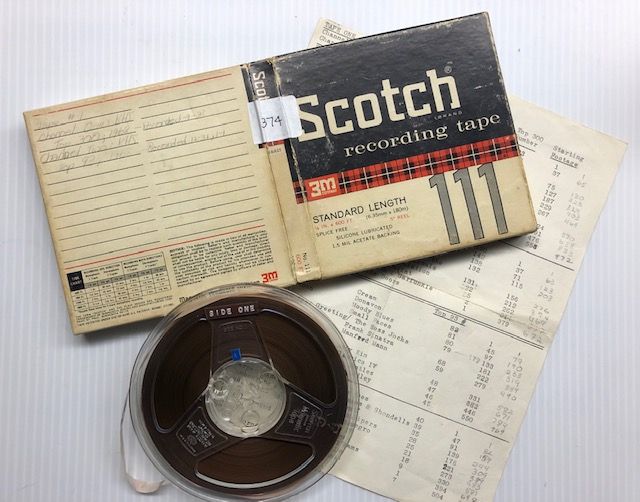 This is the reel I used for the KHJ Top 93 of 1968 and 1968's Top 300. It's recorded as 4-track mono. The track listing is on the right. |
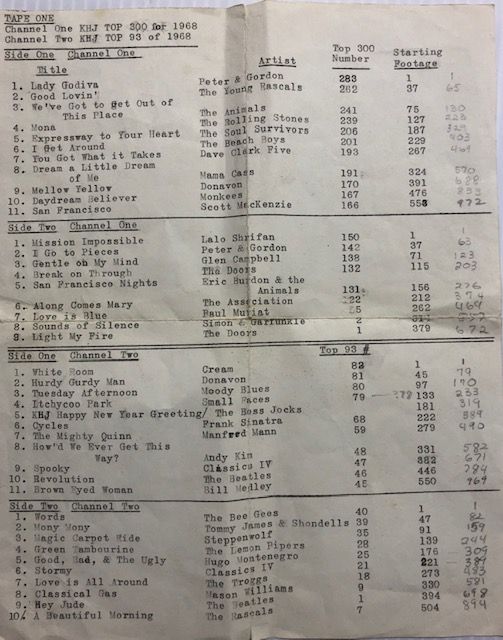
|
Listen to a scoped (music removed for copyright reasons) recording of the 1968 Top 300, recorded September 3, 1968. You will hear the KHJ Boss Jocks. In Part 2 you can hear Bill Wade announce "I Got to Pieces" by Peter and Gordon as by the Dave Clark Five. |
Listen to a scoped (music removed for copyright reasons) recording of the Top 93 of 1967, recorded December 31, 1967. |
Click here to open the booklet as a PDF. |
|
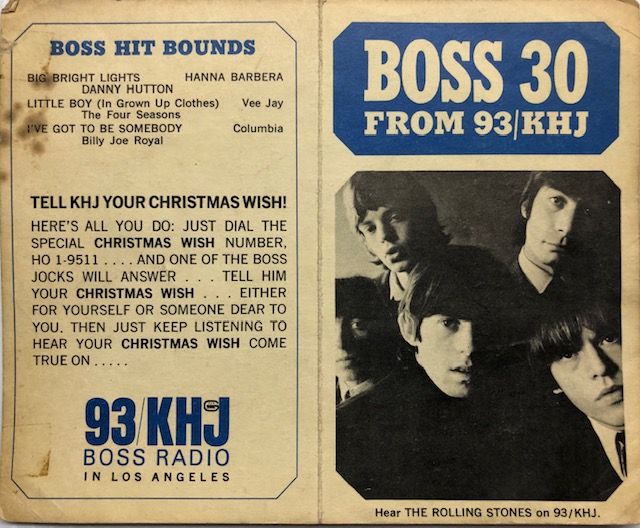 |
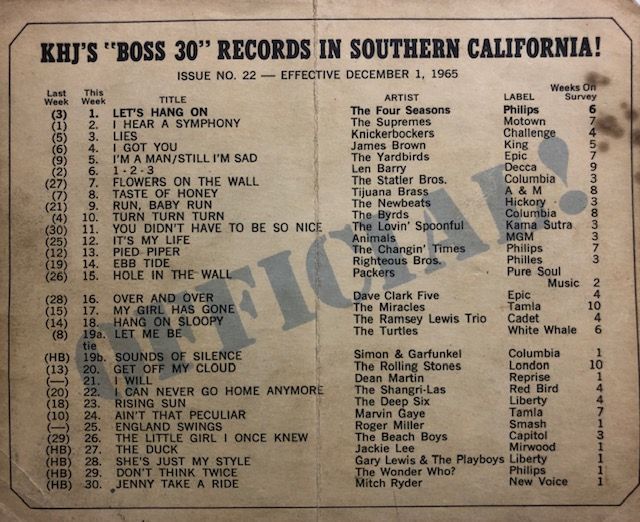 |
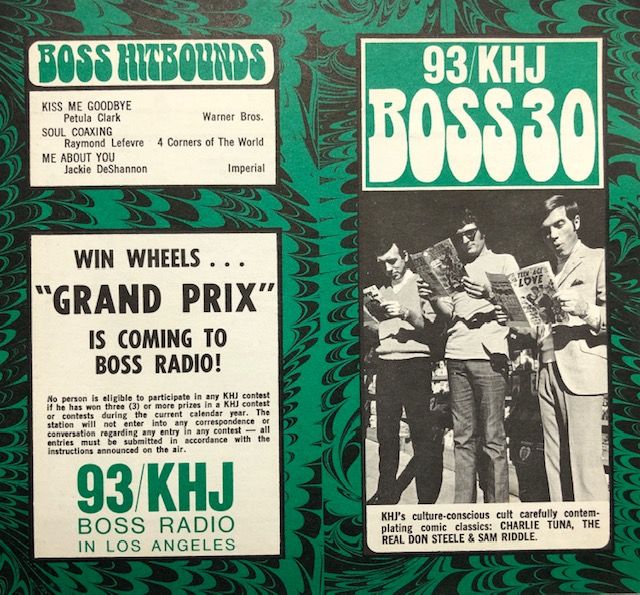 |
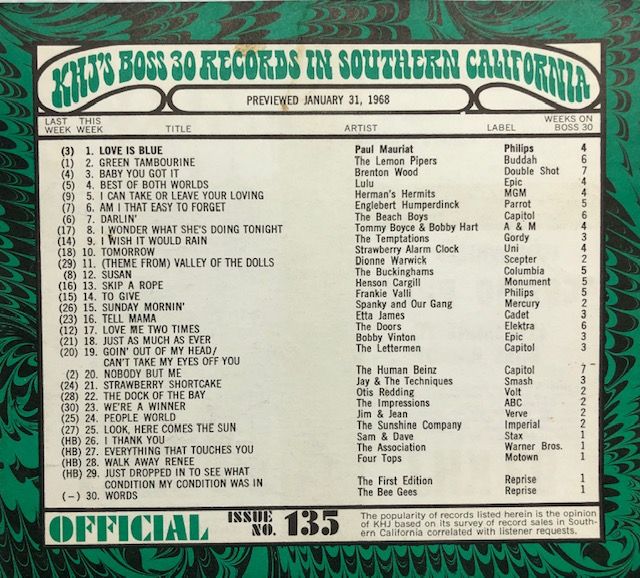 |
I've done some tape trading over the years and in a trade of KHJ material I received copies of two station program logs. You can view them as PDFs.
KHJ Program Log - January 1968 - (3.8 mb)
KHJ Program Log - September 1968 - (3.7 mb)
I also listened to KNX through the 60s because that is what my mom usually had tuned in. In the morning we would hear a mix of music and comedy, hosted by Bob Crane, about the time he became well-known for his role on "Hogans Heroes." Arthur Godfrey was on next, followed by their cooking show with Mike Roy. I have a couple excerpts of Mike Roy that I recorded back in the 1960s on this page.
I got most of my news from radio and on June 5, 1968 I got up in the morning and immediate started recording as KHJ reported on the death of Robert Kennedy.
KHJ News - June 5, 1968 (11:44)
Police Calls
For reasons that are somewhat unclear to me now, I became interested in police work in the late-1960s and into the early 1970s. After high school I attended Long Beach City College and studied the Administration of Justice (AKA Police Science) and eventually received my Associates Degree in that field. In 1970 or so I bought a portable radio that could receive the police band, a Century Sound, shown on the right. As I went through my old tapes I found this snippet, the police calls the night that The Who played a concert in downtown Long Beach and there is a refence to that on this recording.
Long Beach Police Calls - December 10, 1971 (4:37)
I also remember that on August 5, 1971 I went on a police ride-a-long with the Long Beach police. It was intersting. I rode that evening and into the next morning, dropping me off about 3am. The reason I remember the date, or could at least look it up, is that it was the same evening the goverment drew the lottery numbers for my birth year. I remember my mom telling me the next day what my number was: 81. Yikes!!! Yep, got drafted. And the army made me a military policeman.
Shortwave
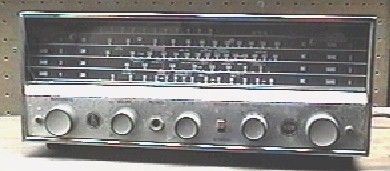 Because I'd asked so many questions about shortwave, my dad gave me a Hallicrafters S-120 multiband/shortwave radio when I was about 12 years old. This kept me pretty busy, listening to everything from ship-to-shore telephone conversations, Radio Moscow, Radio Havana, the Voice of America, and morse code from who knows where. The broadcasts from Moscow and Havana definitely reflected the Cold War sentiments of the time with lots of anti-America propaganda denouncing the "Imperialists."
Because I'd asked so many questions about shortwave, my dad gave me a Hallicrafters S-120 multiband/shortwave radio when I was about 12 years old. This kept me pretty busy, listening to everything from ship-to-shore telephone conversations, Radio Moscow, Radio Havana, the Voice of America, and morse code from who knows where. The broadcasts from Moscow and Havana definitely reflected the Cold War sentiments of the time with lots of anti-America propaganda denouncing the "Imperialists."
Southern California FM Takes Over
In the late-1960s, FM radio started playing popular music and some stations tried to have a counter-culture persona. KNAC from Long Beach was one of these and, in the fall of 1969, even played a bootleg copy of an unreleased Beatles album, selections which later showed up on their "Let It Be" album and Paul McCartney's first solo album. 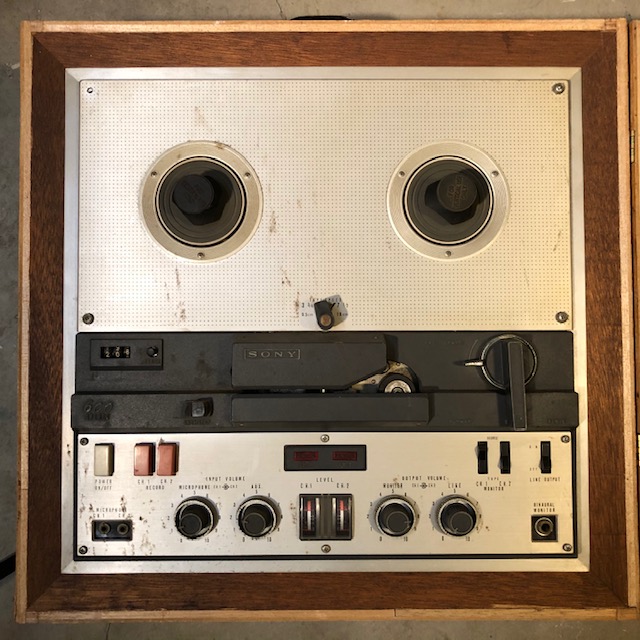 Of course, I recorded this, using my dad's Sony 600D tape deck and his Sansui 1000A receiver, a tape I still have. At the end of that recording was commercial for an upcoming New Years concert headlined by Three Dog Night, a concert I attended.
Of course, I recorded this, using my dad's Sony 600D tape deck and his Sansui 1000A receiver, a tape I still have. At the end of that recording was commercial for an upcoming New Years concert headlined by Three Dog Night, a concert I attended.
You can listen to a clip of that recording by clicking here.
Another station I listened to was KPPC, located in Pasedena, broadcasting from their studio in the basement of the Pasedena Presbyterian Church. They were considered a "freeform" station where the disk jockeys played whatever they felt like playing. It was here that you could hear Country Joe and the Fish, Big Brother and the Holding Company, the Doors, Jimi Hendrix, Janis Joplin, etc. Two years in a row, 1971 and 1972, over the 4th of July weekends, they played a 24-hour Old Time Radio show marathon hosted by Cousin Zino, AKA Harvey Tow. I, of course, rolled tape at the time, recordings I still have. Samples are below:
|
Cousin Zino, AKA Harvey Tow, from KPPC, 1971 |
Cousin Zino, AKA Harvey Tow, from KPPC, 1971 |
Post-1960s, my listening habits changed and expanded. After my return from military service in the mid-1970s I found Los Angeles radio quite a bit more diverse than before I had left. I also found more spoken word programming and I started tuning in to KPFK, the local Pacifica Radio outlet. I really liked their show, "Hour 25," that discussed all things science fiction, the reggae show on Sundays, and the audiophile show after that. Here are some samples from KPFK:
|
An exceprt from the KPFK audiophile show. |
"Hour 25" with guests Ray Bradbury and Norman Corwin from March 31, 1989 |
My university, California State University, Long Beach had its own station, KLON, that played jazz. NPR stations proliferated in the area and I listened to most of them, especially to their Old Time Radio rebroadcasts. One of my favorite stations, of which I was a member, was KCRW. They broadcast the NPR Playhouse in the afternoons which were mostly BBC dramas and mysteries. They also had a great comedy program, "Funny Stuff," hosted by Bob Claster. Another highlight of KCRW were the Joe Frank shows on Friday evenings. Of course, NPR is where I first heard "The Hitchhiker's Guide to the Galaxy" and all three radio versions of the Star Wars trilogy. When pulling a midnight shift on Sunday nights during the mid-to-late-1970s I'd listen to Michael Benner's talk show on KLOS, something I continued to do into the 1980s after I started working days again.
The Later Years
After moving to Montana in 1991 I felt cut off from all that. My dad taped the Old Time Radio shows for me and every once in a while I'd receive a box of tapes of those shows. However, the only spoken word on the radio dial, except for religious broadcasting, came from the sole NPR outlet, KEMC. It carried the usual assortment of NPR news and a few other spoken word shows from that network. They did have their own call-in show for a while, "Your Opinion Please," that was quite good. You can listen to a random show I pulled from my collection below:
Your Opinion, Please - November 21, 2003 (43:49)
As the Internet matured, the need to listen to live radio has diminshed. After all, one can listen to quite a bit of programming on demand and I notice that I tape very little compared to what I used to do. That doesn't mean that radio has died, just changed. As for the spoken word, it has never been easier to find with troves of podcasts out there on every topic one can imagine. I detail this in the New Time Radio links on the left.
Click on an image to enlarge it.
Updated January 2021.